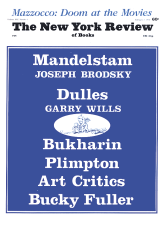In response to:
Warped Innocence from the November 15, 1973 issue
To the Editors:
It is good that a page of NYR is devoted to the narrative of Giorgio Bassani (November 15, 1973). Italy has produced some exceptionally fine novelists in the last thirty or so years who remain virtually unknown to American readers, and I applaud your efforts to publicize even one of them. However, some facts in Richard Ellmann’s review need correcting. First, of the books listed, The Heron is the most recent (published in Italy in 1968); Behind the Door, first published in 1964, follows The Garden of the Finzi-Continis by two years. Five Stories of Ferrara appeared originally in 1956.
Secondly, Professor Ellmann errs in stating that the narrator of The Garden “discovers” that Micòl has betrayed him with his best friend. Rather, the narrator imagines a betrayal; no proof is ever established and Micòl’s character remains to the end elusive. Perhaps De Sica’s elaborate but self-created “discovery” scene in the filmed version of the novel has influenced the reading of the text. In any case, the novel remains deliberately ambiguous in this as in many other matters involving Micòl. Bassani, incidentally, was so enraged by De Sica’s rendering of his story that he tried in a lengthy court battle to stop the film’s release….
Marilyn Schneider
University of Minnesota
Minneapolis, Minnesota
Richard Ellmann replies:
Contrary to Professor Schneider, I should say that the narrator, in The Garden of the Finzi-Continis, does more than “imagine,” he makes an induction from many bits of evidence. Of course it can’t be proved utterly, since the two lovers, only witnesses of the fact, are both dead. But I resist her word “ambiguous,” which disregards the likelihood that he is right, and would render a great many dinners and bicycle-rides even more tangential to the book’s disjointed character. In De Sica’s film, which I had not seen when I wrote my review, the narrator is made into a voyeur—a blatantly cinematic misreading of what in the book is a discovery muted by nostalgia and pity.
This Issue
February 7, 1974



